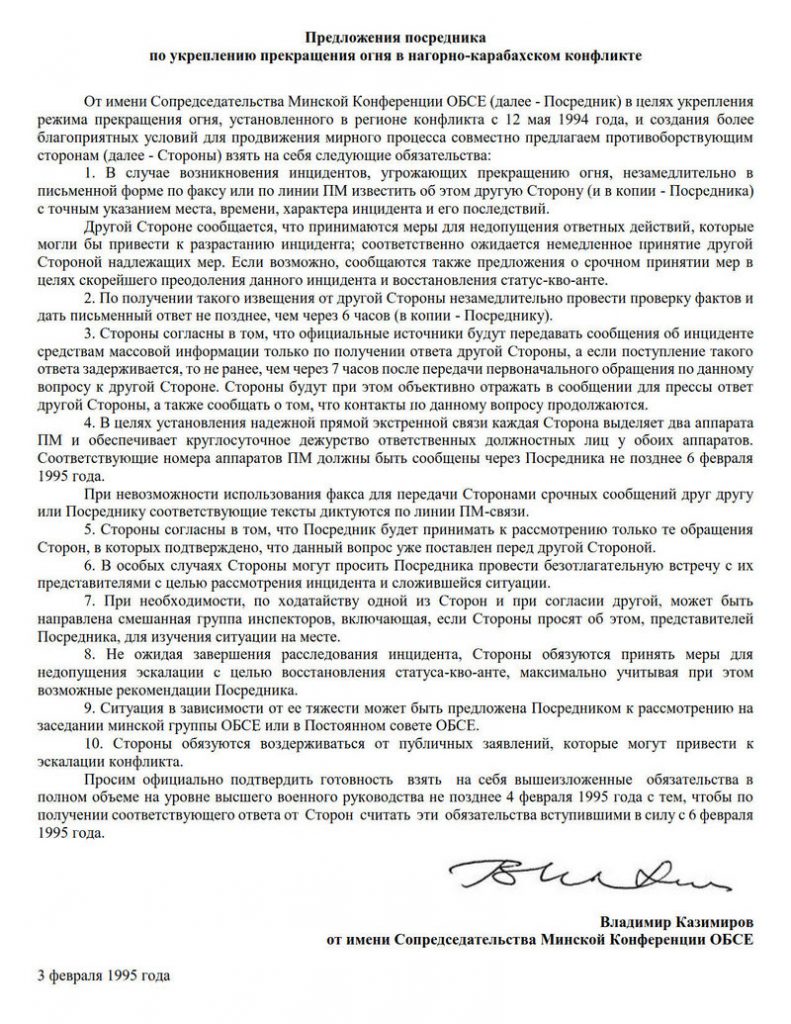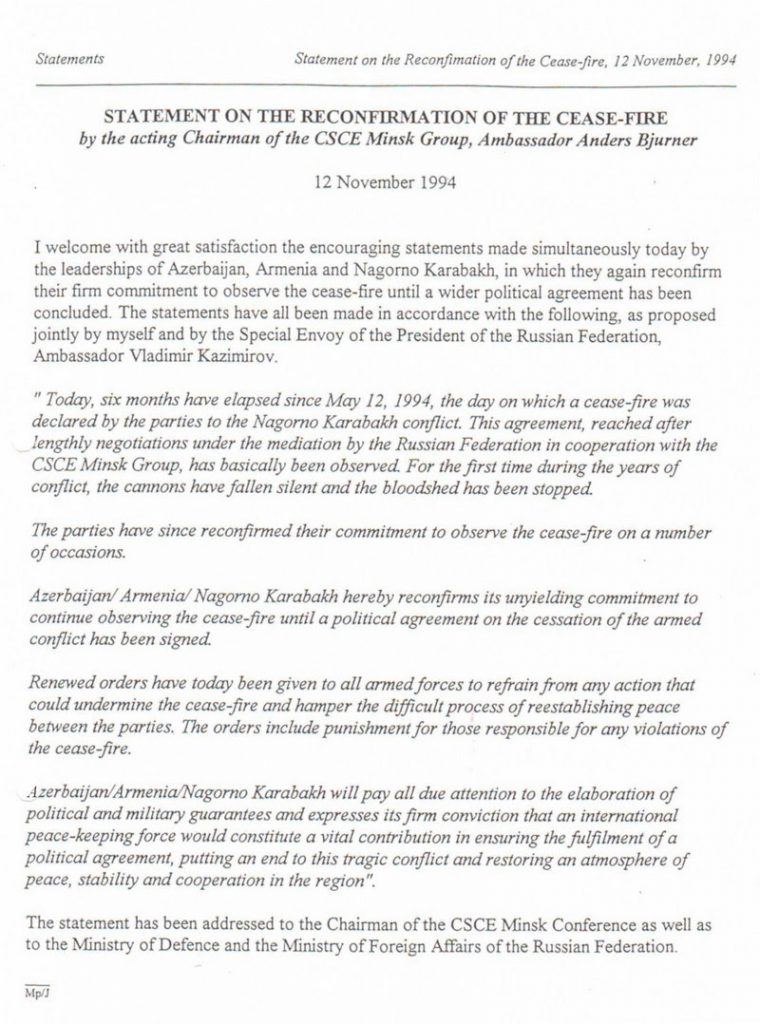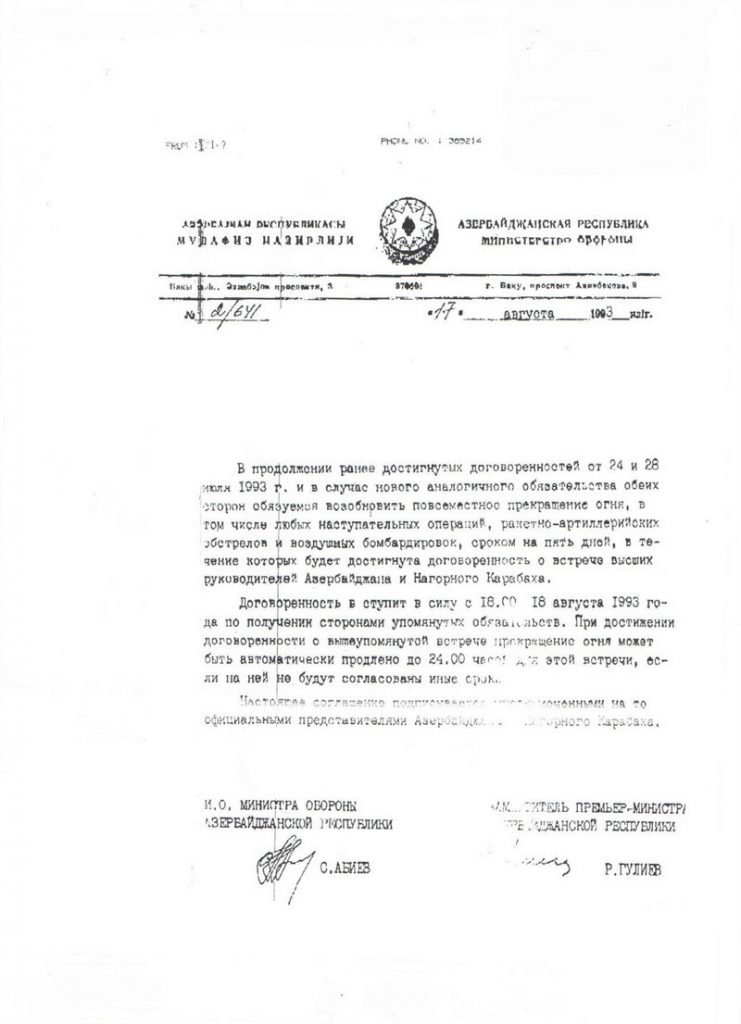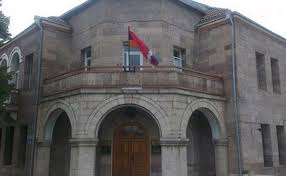Information and Public Relations Department
Ministry of Foreign Affairs of the Republic of Artsakh
The Azerbaijani authorities are persistently trying to present the UN Security Council resolutions on Nagorno-Karabakh (Artsakh) adopted in 1993 as the legal basis for the Azerbaijan-Karabakh conflict settlement. Such an approach is one of the illustrative examples of the arbitrary interpretation of these documents by the Azerbaijani side.
In this regard, it should be noted that in resolving local conflicts, especially those that do not pose a threat to international peace, the UN Charter prescribes to appeal, first of all, to regional organizations. The UN Security Council was guided by this approach also with regard to the Azerbaijan-Karabakh conflict, refraining from direct mediation initiatives in support of the CSCE/OSCE efforts, which was expressly stated in the resolutions. It is for this reason that the UN Security Council did not set any parameters or principles for the settlement of the Azerbaijan-Karabakh conflict. According to the position of the international community, expressed in the resolutions of the UN General Assembly on cooperation between the UN and the OSCE, as well as in the statements of the UN Secretaries-General, the issue of political settlement of the Azerbaijan-Karabakh conflict is the responsibility of the OSCE, which mandated the United States, Russia and France to carry out mediation activities.
Read also
In addition, like any other document, the UN Security Council resolutions cannot be considered outside the context of the time and circumstances of their adoption. All four resolutions were adopted during the period of active hostilities and were aimed at putting an end to the war and starting a political dialogue to reach a settlement exclusively by peaceful means through negotiations, as required by the UN Charter. The point that the UN Security Council did not address the issue of political settlement of the Azerbaijan-Karabakh conflict is confirmed by the fact that after Artsakh (Nagorno-Karabakh), Azerbaijan and Armenia concluded the termless agreement of 12 May 1994 on complete cease-fire and cessation of hostilities; it adopted no more resolutions on Artsakh.
It should be stressed that the UN Security Council resolutions were not implemented precisely because of the position of Azerbaijan, which categorically refused to fulfill fully and in time the basic requirement of all resolutions – the immediate cessation of fire and all hostile acts. Throughout the year since the adoption of the first resolution and until the signing of the indefinite cease-fire agreement in May 1994, the Azerbaijani side repeatedly violated temporary cease-fire agreements or refused to renew them. Against the background of its unwillingness to guarantee peace and commit to the cessation of hostilities, Baku’s appeals to the UN Security Council resolutions were intended to achieve a military advantage to continue the war.
Moreover, Baku’s deliberate policy of destabilizing the situation on the Line of Contact between the armed forces of Artsakh and Azerbaijan, its unwillingness to implement measures to build confidence and reduce tensions, promotion of xenophobia and hatred against Armenians, rejection of direct talks with Artsakh, attempts to isolate it in all possible ways, as well as the obstruction of visits to Artsakh by specialized humanitarian organizations run contrary to a number of requirements and appeals contained in the UN Security Council resolutions, namely: to refrain from any action that will obstruct a peaceful solution of the problem” (resolutions 822, 853); to cease immediately all hostilities and hostile acts with a view to establishing a durable cease-fire (resolution 822); to pursue negotiations through direct contacts between the parties (resolution 853); to ensure the early convening of the CSCE Minsk Conference for the purpose of arriving at a negotiated settlement of the conflict (resolution 874); to restore economic, transport and energy links in the region (resolution 853); to ensure unimpeded access for international humanitarian relief efforts (resolutions 822, 853, 874).
The disruption by Azerbaijan of these resolutions, its attempts to use them to achieve directly opposite goals and justify the continuation of hostilities created a situation in which the UN Security Council ceased to adopt new resolutions.
The statement of 15 April 1994 of the Council of Heads of State of the CIS and the Bishkek Protocol signed on 5-8 May 1994 by Heads of the Parliaments of Artsakh, Armenia and Azerbaijan paved the way for the military leaders of the three designated parties to signing the Agreement of 12 May 1994 on complete cease-fire and cessation of hostilities.
The attempts by Azerbaijan to present certain provisions of the UN Security Council resolutions that it itself disrupted 26 years ago as a basis for the settlement of the Azerbaijan-Karabakh conflict contradict the principle of good faith. By appealing to these resolutions, official Baku actually seeks to achieve a result (military advantage) that contradicts the objectives of the resolutions (an exclusively peaceful settlement of the conflict with a view to strengthening peace and stability). Another evidence of the inadequate interpretation by official Baku of the UN Security Council resolutions and the norms of international law in general is the attempt to present its consent to negotiate as a compromise by the Azerbaijani side. Meanwhile, the peaceful settlement of disputes, including through negotiations, is a legally binding requirement of the UN Charter and cannot be a bargaining chip.
In addition, on 14 March 2008, Azerbaijan initiated the adoption of a resolution by the UN General Assembly on Nagorno-Karabakh, thereby confirming that the Security Council did not deal with the settlement of the Azerbaijan-Karabakh conflict, and its four resolutions adopted in 1993 were not applicable as principles for settlement of the conflict. According to paragraph 1 of Article 12 of the UN Charter, “While the Security Council is exercising in respect of any dispute or situation the functions assigned to it in the present Charter, the General Assembly shall not make any recommendation with regard to that dispute or situation unless the Security Council so requests”. It is noteworthy that all three Minsk Group co-chairing countries, which are also permanent members of the UN Security Council, have voted against this resolution of the General Assembly.
The arguments of Baku regarding the format of negotiations on the settlement of the Azerbaijan-Karabakh conflict are also unfounded. The Azerbaijani side, as a confirmation of its position, is trying to present one of the early letters of the first Chairman of the Minsk Conference, Mario Raffaelli, ignoring both the general context of the discussion regarding the format of negotiations and subsequent decisions taken by the OSCE on this issue. It should be noted that on 23 September 1992, just a week after the previous letter referred to by the Azerbaijani side, Mario Raffaelli sent a new letter to the Acting Chairman of the CSCE Josef Moravčik. In it, the Chairman of the Minsk Conference emphasized that “the Italian Chairmanship had firmly adhered to and continued to adhere to the principle that the formula “elected and other representatives” did not allow for the distinction between the Armenian and Azerbaijani sides of Nagorno-Karabakh”. Further, Mario Raffaelli noted that “a classification of the mandate establishing such a distinction would be justified […] The Armenian population is undoubtably the main interested party not only because it is four times larger than the population of Azerbaijani origin, but also because it exercises de facto control of the territory and is also a party interested in changing the status quo. Thus, for any objective observer, it (the Armenian population of Nagorno-Karabakh – Artsakh MFA) is the main interlocutor of the Azerbaijani government”, the letter says.
The subsequent course of the conflict has convincingly demonstrated that Artsakh is one of its main parties. This is evidenced by, inter alia, several rounds of direct negotiations between Artsakh and Azerbaijan, including a summit meeting, as well as more than 10 agreements reached in 1993 directly between Stepanakert and Baku on limiting hostilities, temporary cease-fire or its extension. In 1993, the international community recognized the status of Artsakh as a full-fledged party to the conflict, which was subsequently reflected both in the UNSC resolutions referred to by Azerbaijan, and in the concluding document of the 1994 Budapest Summit of the CSCE.
As we have noted repeatedly, according to the concluding document of the Budapest Summit, the parties to the conflict are those who confirmed the cease-fire agreed on 12 May 1994.
We consider it necessary to remind once again that the cease-fire agreement of 12 May 1994 was reached by Artsakh, Azerbaijan and Armenia.
On 26-27 July 1994, Artsakh, Azerbaijan and Armenia signed an additional document, in which they confirmed “their commitments to the cease-fire until the conclusion of a large political agreement”.
On 29 August 1994, Artsakh, Azerbaijan and Armenia made official statements in which they publicly reaffirmed their obligations to comply with the cease-fire agreements.
On 31 August 1994, the Ministry of Foreign Affairs of the Russian Federation made a statement in which it noted: “Moscow welcomes the special statements made these days in Baku, Yerevan and Stepanakert expressing satisfaction with the observance by all parties in the conflict of the cease-fire around Nagorno-Karabakh and on the Armenian-Azerbaijani border established through the mediation of the Russian Federation from May 12. Confirmation of the cease-fire orders by the military leaders of Azerbaijan, Armenia and Nagorno-Karabakh, the announcement by each side of penalties for perpetrators of possible violations, the strong determination by the parties to observe the cease-fire until a political agreement is reached on ending the armed conflict increases the confidence that, despite all the difficulties, the peace process in Karabakh can be made irreversible”.
On 12 November 1994, after 6 months of adherence to the cease-fire, Acting Chairman of the Minsk Group Anders Björner made a statement in which “he welcomed with satisfaction the encouraging statement simultaneously voiced by the leaders of Azerbaijan, Armenia and Nagorno-Karabakh, in which they reaffirmed their firm commitments to respect the cease-fire until the signing of a broader political agreement”. It should also be noted that the text of the statement was proposed to the parties by Anders Björner and Plenipotentiary Representative of the Russian President, Ambassador Vladimir Kazimirov.
On 3 February 1995, the co-chairmanship of the Minsk Group appealed to the leadership of Armenia, Azerbaijan and Artsakh with a proposal to strengthen the cease-fire. After receiving consent from all three parties, the mediators sent to Azerbaijan, Armenia and Artsakh a notification of the entry into force of the agreement, as well as indicated government hotline numbers in Baku, Yerevan and Stepanakert for direct emergency communication.
All these facts leave no doubt that the wording of the concluding document of the Budapest Summit on the parties, which confirmed the cease-fire implies Azerbaijan, Armenia and Artsakh (Nagorno-Karabakh). The final clarity on this issue was introduced by the OSCE Chairman-in-Office, Hungarian Foreign Minister László Kovács, who made a special statement at the meeting of the OSCE Senior Council on 31 March 1995 in Prague and “reaffirmed earlier decisions of the OSCE on the status of the parties, i.e. on the participation of the two participating States involved in the conflict, as well as a third party to the conflict (Nagorno-Karabakh) in the entire negotiation process, including the Minsk Conference”.
It was in this trilateral format that the negotiations within the Minsk Group lasted up to April 1997, until they were in fact disrupted by the Azerbaijani side, which was trying to impose the non-consensual proposals submitted by Azerbaijan during the 1996 OSCE Lisbon Summit as the basis for settlement.
It is noteworthy that after the start of the high-level meetings between Armenia and Azerbaijan, the OSCE did not consider bilateral dialogue as a substitute for negotiations within the OSCE Minsk Group. In particular, at the 1999 OSCE Istanbul Summit, the OSCE participating States supported the dialogue between the presidents of Armenia and Azerbaijan and called for its continuation, expressing at the same time hope for the resumption of negotiations within the OSCE Minsk Group.
The documents referred to in the comment are attached.





























































